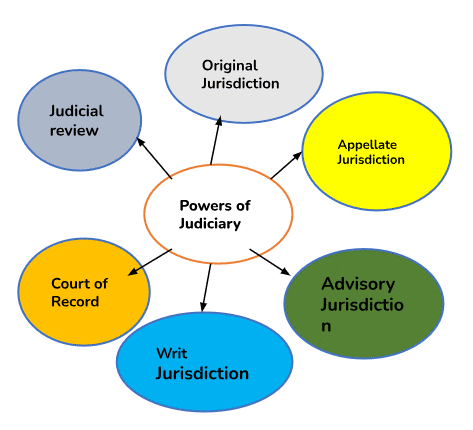Wounding the Spirit of the Constitution of India
Syllabus:
GS 2:
- Indian Judicial System
- Judiciary and Judicial Activism
Why in the News?
The speech delivered by Justice S.K. Yadav of the Allahabad High Court has sparked widespread outrage for its incendiary and divisive tone. It is alleged to have undermined the spirit and letter of the Constitution, prompting calls for judicial accountability.
 The Spirit of the Constitution: A Commons
The Spirit of the Constitution: A Commons
- Constitutional preamble: The Preamble declares India as sovereign, socialist, secular, and democratic, with justice, liberty, equality, and fraternity as its core principles. Justice Yadav’s remarks contradict these ideals by promoting exclusionary narratives.
- A shared legacy: The Constitution is not judicial property but a commons, shaped by the values of Gandhi, Ambedkar, Azad, and other leaders. It demands shared ownership and understanding to promote the common good.
- Judicial propriety under scrutiny: Justice Yadav’s speech represents a breach of judicial norms, aligning with political and mob rhetoric, tarnishing the autonomy of the judiciary.
- The collective ‘We’: The Preamble’s ‘We, the People’ embodies a non-denominational, plural, and diverse collective, rejecting majoritarianism or divisive ideologies.
- Civil disobedience: Drawing from satyagraha and constitutionalism, tactical resistance is proposed as a means to reclaim the constitutional spirit when judicial actions undermine its ethos.
Challenges to Judicial Accountability
- Dog-whistle politics: Judicial speeches like Justice Yadav’s serve as dog-whistles, granting impunity to mobs and escalating sectarian violence under the guise of free speech.
- Erosion of dignity: Such remarks compromise judicial impartiality and contribute to the politicization of the judiciary, weakening public faith in justice delivery mechanisms.
- Slow legal response: The lack of immediate action by the High Court against Justice Yadav indicates a reluctance within the judiciary to self-regulate or uphold its own standards.
- Symbolic impeachment: While impeachment is a logical step, it is unlikely to succeed given the political majority of Justice Yadav’s alleged allies, rendering it largely symbolic.
- Impact on minorities: The rhetoric fuels communal tensions, creating an atmosphere of fear and insecurity for marginalized communities, undermining constitutional guarantees of equality.
Judicial accountability
Judicial accountability is a fundamental aspect of any democratic system. It helps to prevent the concentration of power and maintain a balance between different branches of government.
Some other aspects of judicial accountability include:
- Based on facts and evidence: Judicial decisions should be based solely on facts, evidence, and applicable laws
- Well-reasoned judgments: Judges should provide well-reasoned judgments that demonstrate their neutrality and adherence to the rule of law
- Equitable interpretation of laws: Judges should ensure that laws are applied in a manner that promotes equality and justice
Judicial Responsibility and Propriety
- Maintaining neutrality: Judicial officers must adhere to strict impartiality, avoiding remarks that could be perceived as politically motivated or divisive.
- Reaffirming constitutional values: Judges must embody the spirit of the Constitution, fostering trust in their independence and integrity.
- Strengthening accountability: Clear mechanisms for addressing judicial misconduct must be implemented to restore public confidence.
- Condemning divisive speech: The judiciary should collectively denounce inflammatory rhetoric, ensuring such incidents are met with swift and decisive action.
- Safeguarding secularism: Judges must champion the secular and pluralistic ethos of the Constitution to counter the rising tide of religious and ideological extremism.
Challenges in Addressing Judicial Misconduct
- Resistance within the judiciary: Judges often show reluctance to criticize their peers, leading to a lack of accountability and enabling further misconduct.
- Political interference: The blurring of lines between judicial and political spaces undermines the judiciary’s independence and credibility.
- Inadequate mechanisms: Existing systems for addressing judicial misconduct, such as impeachment, are cumbersome and rarely effective.
- Polarization of public opinion: Divisive judicial comments can deepen societal fractures, making it harder to build consensus on constitutional values.
- Institutional inertia: The slow response to such incidents by both courts and the government exacerbates public disillusionment with justice institutions.
Way Forward
- Strengthen judicial accountability: Introduce robust oversight mechanisms to address and prevent breaches of judicial propriety.
- Encourage collective action: The judiciary must collectively condemn divisive actions to reinforce its commitment to constitutional principles.
- Foster public awareness: Educate citizens on the importance of judicial impartiality and the separation of powers, empowering them to demand accountability.
- Empower civil resistance: Drawing on the legacy of civil disobedience, citizens must actively resist attempts to erode the Constitution’s foundational values.
- Legislative reforms: The government and Parliament must consider reforming impeachment procedures to ensure effective and timely action against errant judges.
Conclusion
Justice S.K. Yadav’s speech highlights a grave challenge to the spirit of the Constitution and the integrity of the judiciary. Upholding judicial propriety and reaffirming constitutional values require collective action from citizens, judiciary, and lawmakers alike. Only through shared commitment to India’s pluralistic ethos can the unity and dignity of the nation be preserved.
Mains Practice Question
Discuss the importance of judicial propriety in maintaining public trust in the judiciary. Examine the challenges posed by politicization of judicial conduct and suggest measures to strengthen judicial accountability in India.




